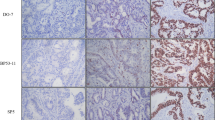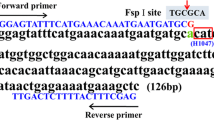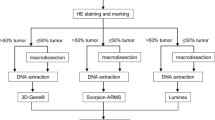Abstract
The present study was undertaken to evaluate p53 gene mutation as a prognostic factor in patients with colorectal cancer. Nonisotopic RNase cleavage assay (NIRCA), recently used for detecting gene mutations, was employed to detect p53 gene mutations in this study. In 15 samples of colorectal tumors, NIRCA was confirmed to be simple, accurate, and thus useful for clinical use, compared with polymerase chain reaction single-strand conformational polymorphism (PCR-SSCP). In another group of 79 cases of colorectal cancer analyzed for p53 gene mutation by using NIRCA, mutations were detected in 58 of 79 (73.4%) cases. Multivariate Cox proportional-hazards analysis showed that p53 gene mutation was a significant prognostic factor in patients with colorectal cancer. Our results showed that NIRCA is a simple and sensitive method, and thus useful for genetic screening of colorectal cancer. Furthermore, our results showed that p53 gene mutation is an independent predictor of poor prognosis in colorectal cancers.
Similar content being viewed by others
References
Harris CC, Hollstein M: Clinical implications of the p53 tumor-suppressor gene. N Engl J Med 329:1318-1327, 1993
Levine AJ, Momand J, Finlay CA: The p53 tumor suppressor gene. Nature 351:453-456, 1991
Nigro JM, Baker SJ, Preisinger AC, Jessup JM, Hostetter R, Cleary K, Bigner SH, Davidson N, Baylin S, Devilee P, Glover T, Collins FS, Weston A, Modali R, Harris CC, Vogelstein B: Mutations in the p53 gene occur in diverse human tumour types. Nature 342:705-708, 1989
Hamelin R, Laurent-Puig P, Olschwang S, Jego N, Asselain B, Remvikos Y, Girodet J, Salmon RJ, Thomas G: Association of p53 mutations with short survival in colorectal cancer. Gastroenterology 106:42-48, 1994
Goh HS, Yao J, Smith DR: p53 point mutation and survival in colorectal cancer patients. Cancer Res 55:5217-5221, 1995
Pricolo VE, Finkelstein SD, Wu TT, Keller G, Bakrer A, Swalsky PA, Bland KI: Prognostic value of TP53 and K-ras-2 mutational analysis in stage III carcinoma of the colon. Am J Surg 171:41-46, 1996
Hardingham JE, Butler WJ, Roder D, Dobrovic A, Dymock RB, Sage RE, Roberts-Thomson IC: Somatic mutations, acetylator status, and prognosis in colorectal cancer. Gut 42:669-672, 1998
Lowe SW, Ruley HE, Jacks T, Housman DE: p53-dependent apoptosis modulates the cytotoxicity of anticancer agents. Cell 74:957-967, 1993
Lowe SW, Bodis S, McClatchey A, Remington L, Ruley HE, Fisher DE, Housman DE, Jacks T: p53 status and the efficacy of cancer therapy in vivo. Science 266:807-810, 1994
Benhattar J, Cerottini JP, Saraga E, Metthez G, Givel JC: p53 mutations as a possible predictor of response to chemotherapy in metastatic colorectal carcinomas. Int J Cancer 69:190-192, 1996
Lenz HJ, Hayashi K, Salonga D, Danenberg KD, Danenberg PV, Metzger R, Banerjee D, Bertino JR, Groshen S, Leichman LP, Leichman CG: p53 point mutations and thymidylate synthase messenger RNA levels in disseminated colorectal cancer: an analysis of response and survival. Clin Cancer Res 4:1243-1250, 1998
Zheng M, Wang H, Zhang H, Ou Q, Shen B, Li N, Yu B: The influence of the p53 gene on the in vitro chemosensitivity of colorectal cancer cells. J Cancer Res Clin Oncol 125:357-360, 1999
Orita M, Iwahana H, Kanazawa H, Hayashi K, Sekiya T: Detection of polymorphisms of human DNA by gel electrophoresis as single-strand conformation polymorphisms. Proc Natl Acad Sci USA 86:2766-2770, 1989
Hamelin R, Jego N, Laurent-Puig P, Vidaud M, Thomas G: Efficient screening of p53 mutations by denaturing gradient gel electrophoresis in colorectal tumors. Oncogene 8:2213-2220, 1993
Nollau P, Wagener C: Methods for detection of point mutations: performance and quality assessment. IFCC Scientific Division, Committee on Molecular Biology Techniques. Clin Chem 43:1114-1128, 1997
Cotton RG: Slowly but surely towards better scanning for mutations. Trends Genet 13:43-46, 1997
Goldrick MM, Kimball GR, Liu Q, Martin LA, Sommer SS, Tseng JY: NIRCA: a rapid robust method for screening for unknown point mutations. Biotechniques 21:106-112, 1996
Prescott J, Patel H, Tillman S, McHugh T, Ralph D: Cleavage of double-stranded copy RNA by RNase 1 and RNase T1 provides a robust means to detect p53 gene mutations in clinical specimens. Electrophoresis 20:1149-1161, 1999
Macera MJ, Godec CJ, Sharma N, Verma RS: Loss of heterozygosity of the TP53 tumor suppressor gene and detection of point mutations by the non-isotopic RNAse cleavage assay in prostate cancer. Cancer Genet Cytogenet 108:42-47, 1999
Shen D, Wu Y, Chillar R, Vadgama JV: Missense alterations of BRCA1 gene detected in diverse cancer patients. Anticancer Res 20:1129-1132, 2000
Tommasi S, Abatangelo M, Lacalamita R, Montemurro S, Marzullo F, Paradiso A: Mutations spanning P53 exons 5–9 detected by non-isotopic RNAse cleavage assay and protein expression in human colon cancer. Cancer Genet Cytogenet 129:40-42, 2001
Dix B, Robbins P, Carrello S, House A, Iacopetta B: Comparison of p53 gene mutation and protein overexpression in colorectal carcinomas. Br J Cancer 70:585-590, 1994
Vet JA, Bringuier PP, Schaafsma HE, Witjes JA, Debruyne FM, Schalken JA: Comparison of P53 protein overexpression with P53 mutation in bladder cancer: clinical and biologic aspects. Lab Invest 73:837-843, 1995
Sjogren S, Inganas M, Norberg T, Lindgren A, Nordgren H, Holmberg L, Bergh J: The p53 gene in breast cancer: prognostic value of complementary DNA sequencing versus immunohistochemistry. J Natl Cancer Inst 88:173-182, 1996
Williams C, Norberg T, Ahmadian A, Ponten F, Bergh J, Inganas M, Lundeberg J, Uhlen M: Assessment of sequence-based p53 gene analysis in human breast cancer: messenger RNA in comparison with genomic DNA targets. Clin Chem 44:455-462, 1998
Hollstein M, Sidransky D, Vogelstein B, Harris CC: p53 mutations in human cancers. Science 253:49-53, 1991
Soussi T, Dehouche K, Beroud C: p53 website and analysis of p53 gene mutations in human cancer: forging a link between epidemilogy and carcinogenesis. Hum Mutat 15:105-113, 2000
Oliver M, Eeles R, Hollstein M, Khan MA, Harris CC, Hainaut P: The IARC TP53 database: New online mutation analysis and recommendations to users. Hum Mutat 19:607-614, 2002
Author information
Authors and Affiliations
Corresponding author
Rights and permissions
About this article
Cite this article
Haseba, M., Hidaka, S., Tsuji, T. et al. Detection of p53 Gene Mutations by Nonisotopic RNase Cleavage Assay as a Predictor of Poor Prognosis in Colorectal Cancers. Dig Dis Sci 48, 1984–1989 (2003). https://doi.org/10.1023/A:1026126522278
Issue Date:
DOI: https://doi.org/10.1023/A:1026126522278




